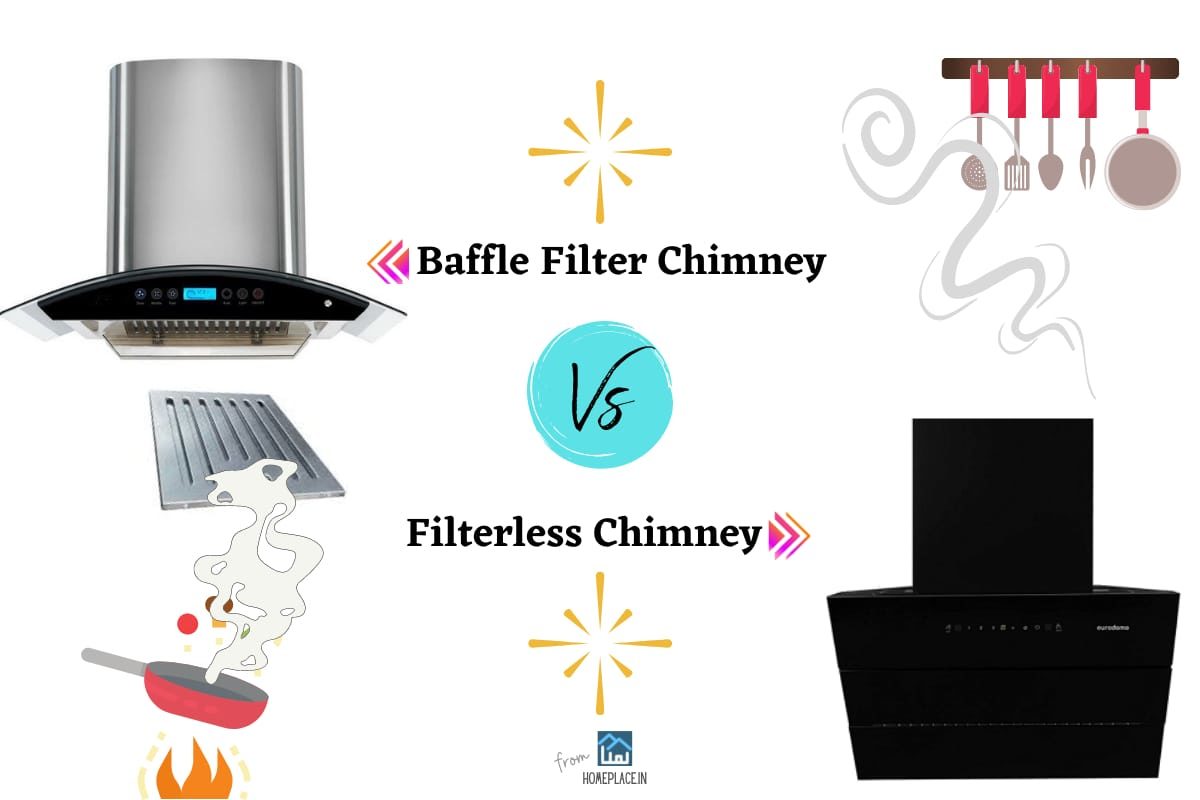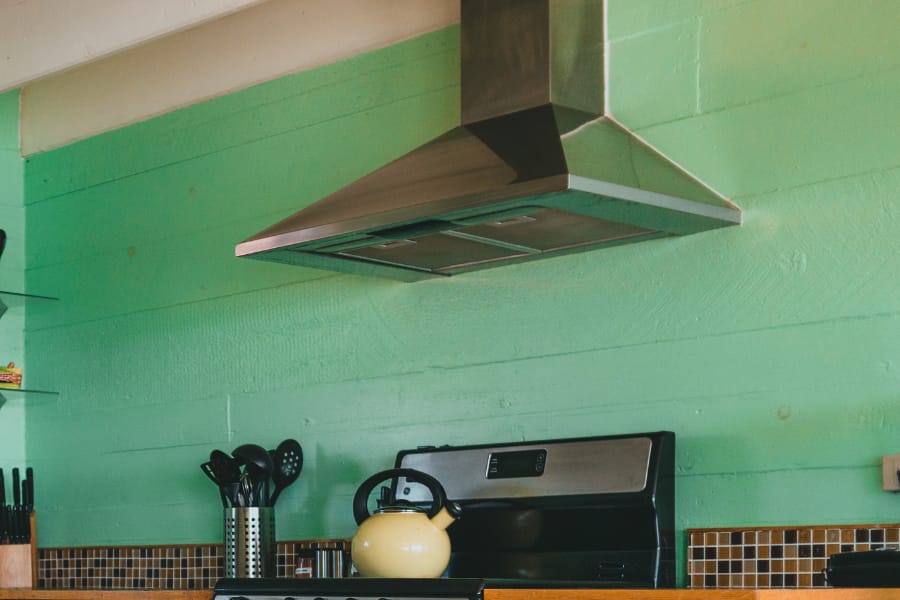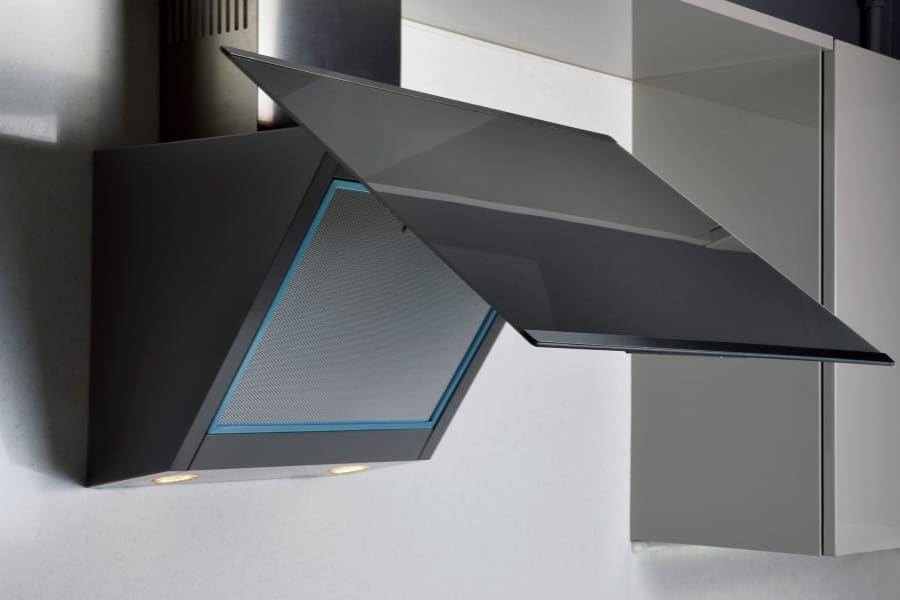Nowadays, you cannot imagine a kitchen without a chimney installed. Earlier, restaurants and hotels only used to have chimneys. However, now every residential modular kitchen also requires the best chimney to keep the kitchen clean and hygienic.
Modern kitchen chimneys have more advanced filtration- baffle filters and filterless systems, making it hard to choose one for your kitchen. Don’t worry, as in this article; you will find which one will be ideal for you between a baffle filter and a filterless chimney.
The main difference between baffle filters and filterless chimneys is that filters require periodic cleaning while the latter does not. However, you cannot judge which chimney you should get with this information only.
You can choose which type of kitchen chimney is suitable for you from the differences and similarities with the pros and cons you can acquire from this article. So, stay tuned.

Baffle Filter vs. Filterless Chimney
| Point of Difference | Baffle Filter Chimney | Filterless Chimney |
|---|---|---|
| Working Method | A baffle filter is the best filter for kitchen chimneys built with interlocking baffles to capture the oil and smoke particles that pass with the airflow. The grease droplets generated during cooking cannot change their direction as they are pretty heavy. Baffle filter chimneys come with an oil collector where the dirty oil is deposited. | A filterless chimney is also a good option for heavy frying or grilling as the oil or the smoke can never get clogged on the filters. |
| Stainless steel and high carbon steel are often the preferable materials by manufacturers. Both of them are durable. | Compatibility with Heavy Frying & Grilling | Baffle filter chimneys can handle heavy frying and grilling. However, the baffle filter can get clogged easily over time. |
| Performance and Efficiency | The baffle filters help the chimney to perform more effectively, and studies have shown that baffle filter chimneys have 90% grease removal efficiency. | Filterless chimneys can also do their work efficiently as their performance is not limited by a filter. |
| Cleaning & Maintenance | Baffle filter chimneys require manual cleaning once in 3-6 months. | Filterless chimneys do not require any manual cleaning, as these kitchen chimneys already have an automatic cleaning facility; the same can be done with just a press of a button. |
| Build Material and Durability | Stainless steel and high-carbon steel are often preferable materials by manufacturers. Both of them are durable. | Stainless steel is mostly used to manufacture filterless chimney because of its anti-corrosive property. |
| Noise Level | Moderate to high. When the baffle filters get clogged, it restricts the path of airflow creating significant noise. | Low. The filterless chimneys make zero or less noise than baffle filter chimneys while working. |
| Power Consumption | Baffle filter chimneys consume more electricity when the filter is clogged. The motor tries to clear the blockage with more power, resulting in higher energy consumption. | Filterless chimneys do not consume as much electricity as baffle filter chimneys. |
| Price & Affordability | Affordable and budget-friendly. | Expensive investment. |
Baffle Filter Chimney

What Is A Baffle Filter Chimney and How Does It Work?
Baffle filter chimneys are upgraded versions of mesh filter chimneys. The baffle filters refer to curved plates made up of either high-quality aluminum or stainless steel.
The working method behind the baffle filter chimneys is simple. It uses a “cut & splash” mechanism which helps in separating the air from the oil and smoke particles. The particulates get trapped in the filter, whereas the air gets out of your kitchen.
This type of kitchen chimney can efficiently make the kitchen cleaner because the baffles easily trap smoke particles and oil. Moreover, the filters help in managing the airflow properly. As the plates are curved, they do not get clogged easily. All of these make the baffle filter chimney work very proficiently.
For the servicing or the cleaning part, you should know some of the baffle filter chimneys that do not come with auto clean technology and they need to be cleaned once in 3 to 4 months. On the other hand, baffle filter chimneys with the auto-cleaning system will require cleaning once in 6 months.
Advantages of Baffle filter chimney
- The mechanism used by baffle filter chimneys, i.e., “cut and splash,” is more efficient in trapping the oil and dust particles.
- The baffle filters are not at all high-maintenance, and cleaning the filters is not complicated at all. Even you can clean the filters in your dishwasher.
- Baffle filters are more durable if compared to carbon or cassette filter.
- As the curbed plates help improve the airflow, the suction power of the chimney motor does not get affected easily.
- The building and functional quality of the kitchen chimneys gets enhanced with the help of baffle filters.
- Last but not least, people in India use a lot of spices and oil to cook their authentic food. For the same reason, baffle filter chimneys are perfect for Indian kitchens.
- As the filters are made of aluminum or stainless steel, they last long.
Disadvantages of baffle filter chimney
- Baffle filter chimneys are cumbersome; the reason is apparent because they are made of heavy stainless steel that takes up much of the space. For the same reason, assembling and detaching the filters for the kitchen chimney can be challenging if you do not have earlier experience.
- When in operational conditions, these chimneys can make loud noises.
- The baffle filters tend to get clogged sooner. To get optimal performance from the chimneys, the users have to invest time and money in servicing and maintenance.
Best baffle filter chimneys
While there are thousands of products in the market, the following baffle filter chimneys are exceptional in design, quality, and performance-
Filterless Chimney

What is A Filterless Chimney, and How Does It Work?
To be precise, filterless kitchen chimneys are comparatively new in the market. The smoke, oil, or grease generated during cooking doesn’t clog the filters, as there are no filters to suck up all of those. For the same reason, the chimneys do not require frequent cleaning like chimneys with baffle filters. In most cases, the auto-clean chimneys can be cleaned with heat/thermal auto-clean technology by pressing a single button. This way, your kitchen stays clean and fresh at the same time.
The motor runs at a capacity set by the user to suck up all the oil, grease, smoke, and odors efficiently because the chimneys do not have any filters. No filter means users don’t have to face any clogging or clogging-related issues at all. This type of kitchen chimney undoubtedly provides a pleasant cooking experience as the motor does not make any noise. Moreover, the kitchen appliance also has an oil collector that stores the waste oil.
That being said, it is also necessary to mention that filterless chimneys are also efficient if the preparations or recipes have too much oil or spices. This is because the impurities cannot get trapped and do not restrict the airflow. If you are a health-conscious person, you can use this type of modern chimney by cooking with less oil.
People who generally have a busy lifestyle, prefer a filterless design for their home after comparing baffle filter chimneys vs. filterless chimneys. Apart from that, the maintenance cost of this kitchen chimney is really less.
Advantages of filterless chimney
- Filterless chimneys are more efficient than baffle filter chimneys in maintaining air quality with a smooth performance.
- These chimneys are easy to use and they do not require a lot of cleaning, servicing, or maintenance because they do not have any filtration system.
- The kitchen chimneys do not generate much sound resulting in a pleasant experience during cooking.
- Filterless chimneys are durable, and they last for a long time.
- These chimneys consume less energy and lower electricity bills than baffle filter chimneys.
- Filterless chimneys are ideal for compact modular kitchens. You can choose a suitable chimney design with adequate suction power.
The disadvantage of filterless chimney
- Filterless chimneys are more expensive than baffle filter kitchen chimneys. This type of chimney is equipped with advanced features like a thermal auto clean system or 3D technology for improved airflow, making it a costly appliance.
Best filterless chimneys
Frequently asked questions
Yes, filterless chimneys are undoubtedly good at their job. This is because the chimneys have a powerful motor that sucks up all the oil, smoke, and odor and helps to keep your kitchen clean and hygienic. Moreover, this type of chimney doesn’t make any sound while working. Apart from that, the chimneys don’t require frequent manual maintenance, so if you are a person who has a busy schedule can have a good experience while using filterless chimneys. You only have to press a button, and the kitchen chimney will be automatically cleaned.
Baffle filters are better than mesh filters but they are not as good as filterless systems. The National Fire Protection Association or NFPA also stated that the fire risk is minimum in the case of those chimneys that use baffle filters.
Both chimneys work efficiently for Indian kitchen that relies on heavy frying or using more spices. Manufacturers use high-quality stainless steel or carbon steel to make the frame and structure of baffle filters and filterless chimneys.
The main difference between a baffle filter and a filterless chimney is that the first one comes with a filter while the other one doesn’t. The baffle filter helps the kitchen chimney have a smooth airflow by removing grease, oil, or dust particles very effectively. On the other hand, the performance of a filterless chimney relies on its motor; when the motor runs with a high suction capacity, the air, odor, and oil get sucked up. Baffle filter chimneys require manual cleaning every quarter, whereas filterless chimneys don’t require manual cleaning because they come with a heat auto-clean facility.
Other alternative filters to baffle filters are mesh and charcoal filters. Mesh filters are layers made of aluminum mesh, whereas charcoal/carbon filters are made of charcoal slate that has holes in them. The mesh filters require frequent manual cleaning (once every week), whereas the charcoal filters are not washable. Mesh filter chimneys typically have moderate durability; however, you must replace the charcoal filter every 3-4 months. Mesh filter chimneys are not that much expensive, but carbon filters are costly.
So, Which Chimney is Better- Baffle Filter or Filterless?
From the comparison of baffle filter vs. filterless chimneys, we can find that filterless chimneys are definitely a better option if you want to avoid cleaning hassles and have a higher budget. Because of these reasons, all the reputed brands like Faber and Elica are designing next-generation filterless chimneys instead of typical baffle filter chimneys.
If you are health conscious and prepare your food will less oil and spices, you can easily choose filterless chimneys. This is because they are modern, and perform effectively. You do not have to worry about changing the filters or cleaning the chimney manually, as these kitchen chimneys can be cleaned with the automatic thermal or heat auto-cleaning system.
On the other hand, you must keep in mind that the baffle filter chimney will require thorough manual cleaning every 3-4 months (more or less). So, check your requirements, compare them with the pros and cons, and choose any of the baffle filter or filterless chimneys for your kitchen.
Related Post:
